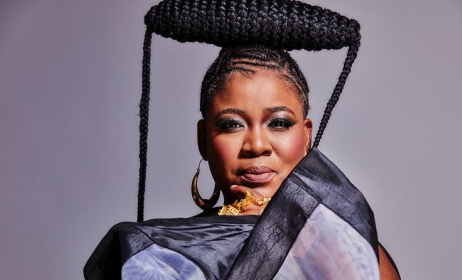Amanda Black: Mnyama is about reclaiming my mental health
South African vocal powerhouse Amanda Black’s rise to fame has been an emotionally difficult journey riddled with challenges and high expectations. On her third album Mnyama, she finds healing and breaks free from those mental shackles.
 Amanda Black. Photo: Facebook
Amanda Black. Photo: Facebook
The singer’s journey started after she posted a birthday song dedicated to her friend on YouTube in 2013. Now almost a decade later, the 28-year-old musician commands a huge following and is among the artists working tirelessly to promote Afro-soul in South Africa. Amanda Black’s music is steeped in African folk stories interweaved with authentic narratives and poetry. She builds on this momentum with the latest collection.
The introspective album – which features artists like Kwesta, Berita, J’Something and Christer – is intended for listeners seeking healing, through poignant and powerful songs such as ‘Ungayeki’, ‘Pick Yourself Up’ and ‘Ekhuphileni’.
“I have bared my soul for the listener to encourage them to be okay with doing the same with themselves,” Amanda Black says.
Unlike her two previous albums, Amazulu and Power, Amanda Black says Mnyama is the first collection that had nothing to do with proving herself to anyone. “It was about me and my mental process, ultimately my mental health, because I allowed myself to be vulnerable and face the things that I normally would distract myself from.”
Melancholy is apparent on songs like ‘Amaginxiginxi’, ‘Lonely’ and ‘LWH’. Mnyama can be best described as a sonic salve for emotional wounds, which Amanda Black believes is self-love. “We always expect to have a final destination, but the final destination is you – you have to be okay with you. It’s the biggest part of the journey,” she says.
Some songs are nostalgic, like ‘Always’, and Amanda Black uses them as a carthasis in the face of adversity. “My roots have always been my grounding source and I encourage people to never lose sight of themselves. And if they do, which often happens because this is life, they should go back to the beginning to help them see the vision again – to see themselves again.”
Amanda Black is adamant that the album will help listeners find spiritual healing. “It is an account of my own reflections and conversations with myself, and it urges the listener to not rush the healing process, but rather face it and allow it to happen, becasue the real melancholy stems from trying to run away from ourselves.”
Music style and composition
Amanda Black says her music has stylistically evolved with Mnyama and she’s becoming more like the epitome of the musician she aspired to be. She describes her creative process as “different every time, sometimes it starts with a melody, sometimes words come first. Sometimes they come all at once. I really just let the music come however it feels,” she says, adding that Mnyama’s songwriting process “really depended on how I felt like processing that day. Some songs like ‘Amagingxigingxi’ were freestyled on the guitar.”
In terms of her favourite song on the album, the former Idols SA contestant is somewhat conflicted: “They are all my babies, I can never pick one because they all mean something different. But if I have to shoot, the most special one is my grandmother's favourite hymn, ‘Ekuphileni’ featuring J'Something.”
Amanda Black says the production process was not without its obstacles. “I’d say all my projects have had their own challenges. I think it’s never smooth sailing when you create something worthwhile.”
Stream and download Mnyama here.




























Comments
Log in or register to post comments